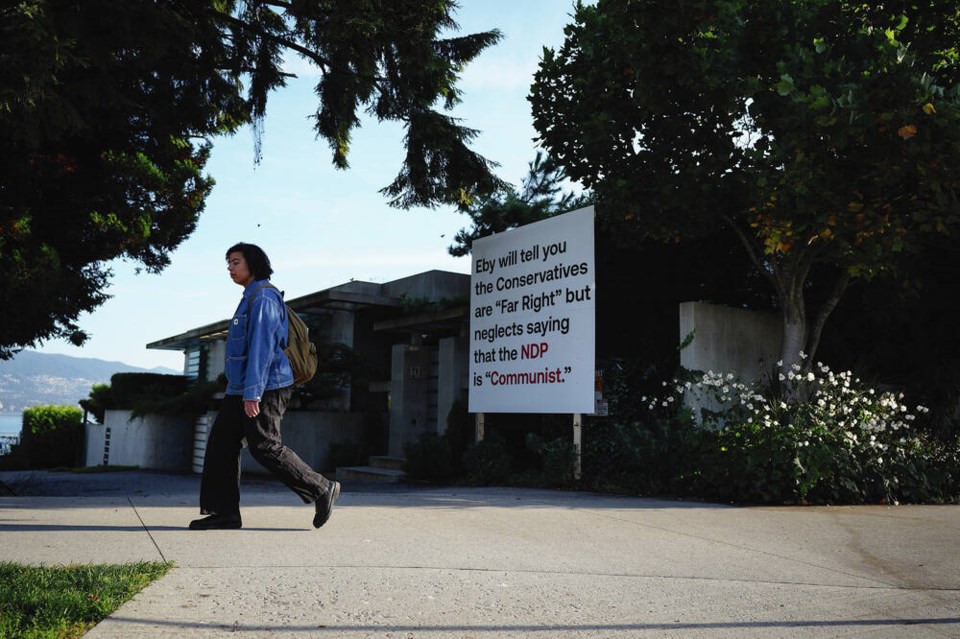You can’t have an election in B.C. without a dash of class warfare, but it’s more obvious than usual this time around.
The philosophical gap between the major parties is more pronounced since the middling BC United camp gave up in August and ceded to the Conservative Party of B.C.
The rhetoric has escalated accordingly. This week it touched on a prominent billionaire who quickly became a symbolic representative of the haves, as opposed to the have-nots.
Chip Wilson, the founder of Lululemon, put up a billboard in front of his house (assessed at $82 million, the most expensive home in B.C.) proclaiming that “the NDP is Communist.”
It’s in NDP Leader David Eby’s Vancouver-Point Grey riding, no less. Asked about it Friday, Conservative Leader John Rustad said: “I don’t disagree … when he calls David Eby a communist.”
Continuing the thought, he said: “David Eby seems to think that the private sector has no role in providing housing and I’m not interested in Soviet-style housing in B.C.” Eby retorted Friday: “If you’re a billionaire like Chip Wilson, I understand I may not be your guy… I guess John Rustad is your guy.”
Eby acknowledged earlier that the NDP increased property taxes on homes worth more than $3 million. He said the top two per cent of British Columbians are paying higher taxes “and we use that money to support the rest, who are really struggling with affordability.”
“I know when you are so rich that the Red Hot Chili Peppers play for your birthday party, it’s possible to lose perspective.”
Rustad has also repeatedly referred to Eby’s “radical ideology” during the campaign.
Eby and the NDP have happily returned fire, portraying Rustad as a dangerous extremist whose policies aid the rich and hurt regular working people.
“Fomenting fear and misinformation is something that John and the Conservatives want to do in this election, and pit people against each other,” Eby said.
Much of the class-conscious name-calling centres on housing policies. Housing is ground zero for the affordability crisis, so the clash of ideas on that issue is acute. It covers big versus small government, public versus private initiatives and promises versus results.
Eby tackled housing again Friday, promising to double the speculation and vacancy tax that was introduced seven years ago to discourage speculation and encourage owners of vacant properties to rent them out.
Despite dramatic legislative moves and billions of dollars worth of commitments by the NDP in the past few years, he had to commiserate once again with people searching for a place to live “and realizing that maybe I’m never going to be able to get in the market. … It’s an urgent problem and it didn’t show up overnight.”
Discussing people stuck in substandard housing, he said: “That’s not how it’s going to work in our province. That can’t be how it’s working.”
He announced the speculation and vacancy tax, which applies in dozens of communities, will be doubled — to one per cent of the vacant home’s value for B.C. citizens, and three per cent for non-resident owners.
“You can avoid the tax entirely by renting out your home. We actually don’t want people to pay this tax,” Eby said.
The government said it prompted thousands of new rentals over the past several years. Even so, it brought in about $80 million a year from owners who stood pat, despite the extra cost. The revenue is trending upwards as more communities are included in the tax’s coverage.
Rustad was non-committal about the speculation and vacancy tax, saying it is something that needs to be looked at.
But one of his candidates promised at a public meeting he would repeal it.
Rustad said the NDP blames everyone but themselves for housing problems.
“First it was foreigners, then it was speculators and then it was vacant properties, and then it was Airbnb. David Eby has been looking for the boogeyman in the cupboard. … My perspective is [he] created the barriers for being able to get housing going. We want to make sure that we unleash the potential of the private sector.”
He cited a 30 per cent decline in housing starts this year as being unacceptable.
Just So You Know: Thursday’s column about the Vivid condo project said the units were supposed to be available only to first-time buyers.
The original qualification was to people who didn’t own property anywhere else. My regrets.
>>> To comment on this article, write a letter to the editor: [email protected]




